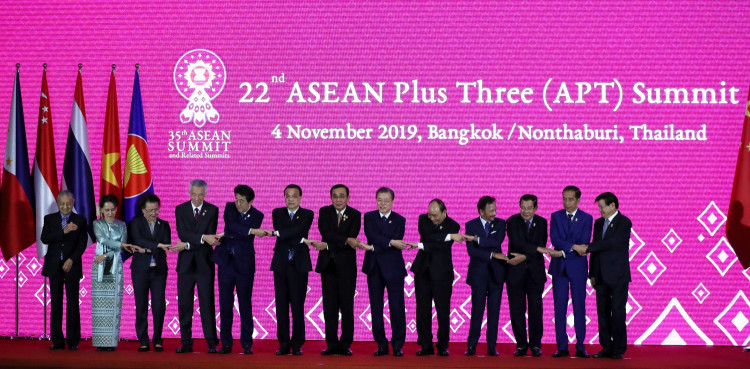Chinese president Xi Jinping is trying to convince Japanese prime minister Abe Shinzo not to abandon the massive Regional Comprehensive Economic Partnership (RCEP) trade deal, which when ratified will be the largest free trade agreement (FTA) in history.
Xi and Abe are meeting Monday in Beijing as diplomatic and trade ties between both Asian economic superpowers gradually return to normal after years of bickering over the status of the Japanese islands also claimed by China.
Abe has previously said Japan will not join RCEP if India (China's great regional rival) refuses to do so. The exclusion of Japan and India -- two of Asia's three largest economies -- from RCEP will degrade the proposed trade pact into just another regional deal instead of becoming the world's largest FTA. Japan, however, has said it will do what it can to convince India to change its mind.
India indicated its intent to withdraw from RCEP in early November saying the deal will flood the country with cheap Chinese goods and will put its domestic industry and agriculture at grave risk. India said the RCEP member countries haven't persuaded it this won't be the case.
"The present form of the RCEP Agreement does not fully reflect the basic spirit and the agreed guiding principles of RCEP," said prime minister Narendra Modi in his address at the RCEP summit in Bangkok. "It also does not address satisfactorily India's outstanding issues and concerns. In such a situation, it is not possible for India to join RCEP Agreement."
India, however, later said its decision isn't final.
"India's final decision will depend on satisfactory resolution of these issues," said a statement issued in Bangkok later on.
RCEP is an FTA between the 10 member states of ASEAN or the Association of Southeast Asian Nations (Brunei, Cambodia, Indonesia, Laos, Malaysia, Myanmar, the Philippines, Singapore, Thailand, and Vietnam) and their five FTA partners (Australia, China, Japan, New Zealand and South Korea).
The 16 prospective member-states (including India) account for a total Gross Domestic Product (GDP, PPP) of $49.5 trillion, or 39 percent of the world's GDP. They have a combined population of 3.4 billion people, or about half of the world population.
India has a huge trade deficit with RCEP countries and wants specific protections for its industry and farmers from the inevitable flood of imports, especially from China. Piyush Goyal, minister of railways and commerce said the decision not to join RCEP will boost Modi's "Make in India" nationalism campaign. He also lauded Modi for his "bold and courageous decision to not join RCEP, since it was against our economic interests and national priorities."
In November, Hideki Makihara, State Minister of Economy, Trade and Industry said Japan isn't considering signing RCEP without India.
"It is meaningful from the economic, political and potentially the national security point of view," said Makihara to Bloomberg about India being part of the agreement. "Japan will continue to try to persuade India to join."
Makihara said RCEP is definitely a key regional cooperation area where China and Japan will need to work together, especially since it is difficult to make progress on security.






